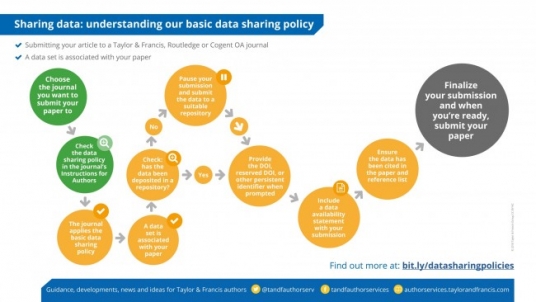Opening up the research lifecycle: Taylor & Francis introduces new data sharing policies

Today Taylor & Francis introduces a suite of new data sharing policies to drive open scholarship forwards and help the research communities we work with achieve their goals.
Data is a key research output, therefore sharing it presents a multitude of opportunities for research and researchers. The new policies aim to promote increased sharing of data to improve the robustness of the entire research process, supporting transparency, reproducibility, and replicability of results.
Data citation capabilities will be introduced, enabling researchers to get and give credit for their valuable data findings. Where authors share data, they will be required to include a data availability statement, which will improve the discoverability of their research. Our policies range from encouraging data sharing to making data open with a license, offering flexibility while ensuring the needs of different fields and disciplines are met.
Caroline Sutton, Director of Editorial Development at Taylor & Francis and a member of the OASPA Board of Directors, said:
“The scholarly publishing landscape is in a state of transformation, with discourse expanding beyond open access to consider how the entire research lifecycle can be opened up. The introduction of these data policies is a testament to how Taylor & Francis, together with its partners, is developing new services in response to this, as well as seeking to help drive a transition towards more open research practices.”
A basic policy encouraging data sharing will be applied to all titles owned by Taylor & Francis, with an aim to move many journals to more progressive data sharing policies during 2018 following consultation with our partners.
At the start of this year, the open scholarship options for Taylor & Francis authors were further increased with the launch of Big Earth Data, a journal that uses open data to advance discoveries in Earth Science. Last month, Taylor & Francis also announced a new partnership with Code Ocean, enabling researchers to share and run code to generate data simulations.

 China
China